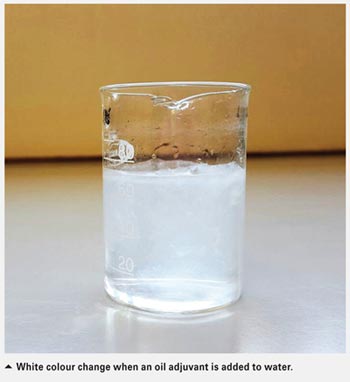September 2015
HESTIA NIENABER, ARC-Small Grain Institute, Bethlehem
Adjuvants can be defined as a substance that is added to the spray solution to enhance or modify the action of an herbicide or the physical characteristics of the spray mixture. Adjuvants are used to increase herbicide efficacy, but have no herbicidal effects of their own.
Although there are many adjuvants on the South African market, most adjuvants that are introduced to the South African market and markets worldwide, are primarily used to make products more compatible with glyphosate.
This is mainly due to the fact that glyphosate is the most widely sold herbicide worldwide. The correct choice of adjuvant could mean the difference between excellent control and no control at all.
There are still producers who do not use adjuvants and this is mainly because of the following reasons. Many doubt whether adjuvants provide a financial benefit, some are discouraged by the number of products to choose from, while others are simply not aware of the benefits that adjuvants may offer.
Different adjuvants have different characteristics and therefore adjuvants are chosen with specific outcomes in mind.
The choice of adjuvant can be very overwhelming when confronted with several different types. Adjuvants can be divided into various categories (B.L. de Villiers, 1998) to make the choice easier.
Adjuvant categories
 Surfactants (surface active ingredient)
Surfactants (surface active ingredient)
These substances lower the surface tension of the spray solution droplet, which usually increases droplet spreading. The droplet is retained by the target leaf and is able to spread more easily on the leaf surface. These surfactants also lower the contact angle between the droplet and the leaf surface, thus bringing more herbicide into contact with the leaf surface.
Oils
Oil adjuvants can be characterised by a white colour change (Photo 1) when the adjuvant is included in the spray tank/mixture. Oil adjuvants are used to increase herbicide penetration by disrupting the waxy layers on the cuticle of the leaf surface. Oil adjuvants can also aid in the spreading and retention of the droplet on the leaf surface.
Salts
These adjuvants have two major benefits: It conditions hard water to minimise the potential negative impact from mineral deposits interacting with the herbicide and it helps to transport glyphosate across the surface membrane of the target weed, allowing for good coverage and product uptake by the plant.
Thus, these adjuvants are excellent in overcoming salt antagonism from the water source (calcium, magnesium and sodium compounds) and are used in South Africa with glyphosate for penetration and compatibility purposes.
Drift control agents and anti-evaporants
Drift control agents are used to ensure that as much of the spray solution as possible reaches the target and to prevent off-target injury to susceptible plants.
Buffers and acidifiers
Acidifying agents which contain sulphuric, citric or phosphoric acids are normally effective in overcoming antagonism by salts of calcium, magnesium and sodium in carrier water. Products that contain contain acetic acid (organic acid), on the other hand, are normally used to stabilise (buffer) the pH at desired levels (4 - 6) for certain herbicides if added in adequate amounts. Unregistered concentrated acids should never be added to spray solutions.
Stickers
These adjuvants prevent wash-off caused by rain, loss by wind erosion and extend the life of the herbicide on the leaf surface by sticking the herbicide to the surface.
Research results
Extensive research on adjuvants and herbicide efficacy has been done by the ARC-Small Grain Institute. Much of the research done is focussed on glyphosate, however, all herbicides are tested with adjuvants to determine optimal efficacy. Many producers use poor quality water for their spray mixtures.
Poor water quality is due to the presence of salts in the carrier water and can be classified as hard water (simulated with CaCl2 water) or brackish water (NaHCO3 water). Salts in the carrier water may decrease herbicide efficacy of certain herbicides (such as glyphosate), as a result of poor absorption into the leaves.
A study was performed with three different water types (distilled, hard and brackish water) and the influence it had on glyphosate efficacy (Graph 1). It was found that hard and brackish water antagonised glyphosate efficacy.
Only brackish water antagonised the efficacy significantly. The addition of ammonium sulphate (AMS) increased the percentage control recorded in all three water types. The addition of AMS to the carrier water in brackish water increased the percentage control significantly from 52,68% to 94,19%.
The effect of iron in carrier water was also determined in studies (Graph 2). The results clearly indicated that glyphosate efficacy decreased with an increase in the amount of iron in the carrier water.
The decrease in efficacy, however, was not significant. Some adjuvants were tested to determine their ability to overcome antagonism caused by iron. None of the adjuvants tested were successful and more research is being done to address this problem.
Results from these studies clearly indicate that different salts in the carrier water have an effect on the efficacy of glyphosate. This is also true for most water soluble herbicides. However, there are exceptions of non-water soluble herbicides that are sensitive to salts in the water. It is therefore recommended to always use clean water, as far as possible.
Conclusion
Always read the label and know what you are getting. Remember that not all AMS adjuvants are of the same quality. Make sure that the product you have chosen has enough ammonium ions in it to successfully transport the herbicide and overcome the salts in the carrier water. Make use of high quality adjuvants and use them correctly to enhance herbicide activity. An increase in herbicide efficacy will result in a positive return on the additional investment made.
 For further information, contact Hestia Nienaber at 058 307 3420 or deweth@arc.agric.za.
For further information, contact Hestia Nienaber at 058 307 3420 or deweth@arc.agric.za.
Reference
De Villiers, B.L. 1998. Adjuvant, acidification and water quality influences on herbicides. ARC-Small Grain Institute.
Publication: September 2015
Section: Focus on